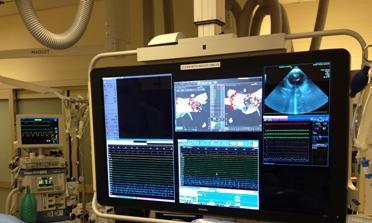
Cardiac Electrophysiology is a rapidly growing subspecialty of cardiology which focuses on the diagnosis and treatment of cardiac arrhythmias. The cardiac electrophysiology (or “EP”) laboratory is a specialized invasive procedure area where various procedures are performed, including diagnostic electrophysiology studies, catheter ablations, pacemaker and implantable cardiac defibrillator (ICD) implantations, Laser extraction of pacemaker and ICD leads, and implantation of biventricular pacing devices for treatment of congestive heart failure.
Our cardiac EP laboratory is the only one in Westchester County to offer catheter ablation of complex arrhythmias such as atrial fibrillation and ventricular tachycardia, as well as Laser lead extraction, and left atrial appendage occlusion.
Cardiac Electrophysiology (EP) Studies at Westchester Medical Center
The heart has an electrical system which controls its rhythm. The normal “pacemaker” of the heart is the sinus node in the top of the right atrium; one of the upper chambers of the heart, which normally initiates and controls the heart rate. The electrical activity then travels to the AV node in the middle of the heart which holds and delays the activity to allow time for the top chambers to pump the blood to the bottom chambers. It then travels to and stimulates the bottom 2 chambers (“ventricles”) which then pump the blood to the body and to the lungs.
Abnormalities in the heart's electrical system can cause slow rhythms such as sinus bradycardia or heart block, fast heart rhythms such as atrial fibrillation or flutter, supraventricular tachycardia, ventricular tachycardia, or ventricular fibrillation. These abnormal rhythms can cause symptoms of palpitations (abnormal fluttering), lightheaded or dizzy spells, syncope (passing out) or even death.
An electrophysiology study is a safe and relatively painless test which is used to: determine the cause of symptoms; determine if a patient is at risk of an arrhythmia (abnormal heart rhythm); determine which type and where the arrhythmia originates; determine the best type of treatment (e.g. possible pacemaker, defibrillator, medication, or ablation), and potentially to treat and cure the arrhythmia.
The Electrophysiology study is done by an electrophysiologist (cardiology physician specializing in arrhythmia management) using fluoroscopy (x rays) and small catheters (tubes with small pacemaker tips), placed through the vein in the groin, and then threaded to the heart. Patients are awake (but sedated) during the procedure and don’t feel the catheters being placed into the heart. The electrophysiologist uses a computer to stimulate the heart to test the electrical system and to potentially induce (start) the abnormal rhythm. This information allows the physician to determine the best treatment. If the treatment is catheter ablation this is often done at the same time to potentially cure the abnormal rhythm. If the treatment is to be a pacemaker or implantable defibrillator (ICD) this is generally done separately, often during the same hospitalization. Medications can be used to stimulate the heart and to test the rhythm. The EP study generally takes one to two hours.
After the procedure, the catheters are removed, pressure is held, patients can remain in bed and are welcome to have their families and loved ones sit with them in the ambulatory unit. Patients are generally discharged the same day--or the following day if a pacemaker or ICD implant is required.
To learn more about the services provided by Westchester Heart and Vascular please contact us at:
866-WMC-HEART (866.962.4327).